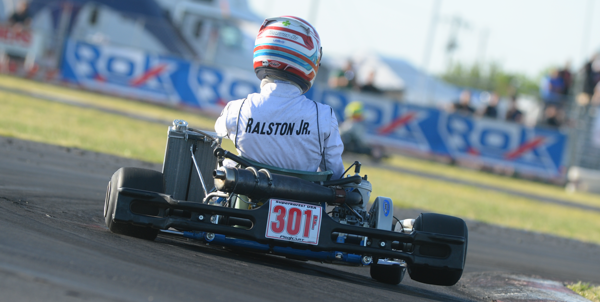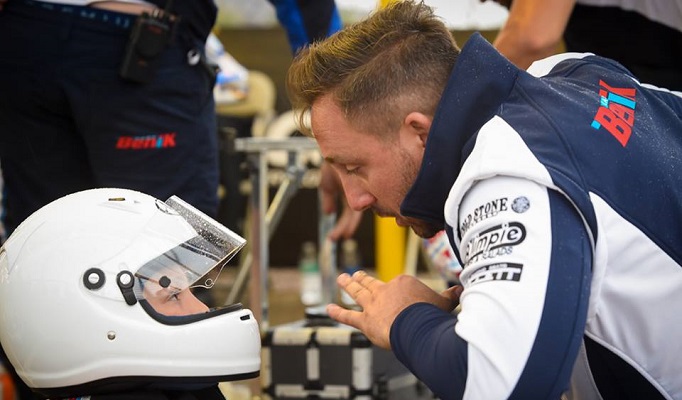So, recently there was a discussion on the forums about what separates a ‘pro’ driver from the average ‘Joe.’ In my opinion, one area that a lot of people seem to struggle in is giving good feedback after an on-track session. So, I wrote up this first intro piece to what I hope is a set of ‘articles’ about giving better feedback.
Feedback: The Art of the Debrief

PC: OnTrack Promotions
For most of us, it should come as no surprise that we do not operate in a vacuum. Each day, we are often forced to grapple with the countless decisions, emotions, and memories brought upon us. Over time, our brains become conditioned to withstand the constant bombardment.
From the beginnings of the sport, karts have served as an instrument to test our brain’s ability to process. After all, there are few things in life as bombarding to our minds as attempting to wrestle a kart around a race track for laps on end. It is not surprising that when someone comes up to you after one of these wrestling matches, and asks you to recall it in all of its glorious minutiae, most of us won’t feel up to the task. After all, you may think, I was just trying to stay on the track…You mean, I have to remember other stuff?!!!
Yes, and you must remember more! That is why you are here. In order to become faster, you want to learn how to give better feedback. After all, why wouldn’t you? The ability to give enhanced feedback will help you as a driver remember more details, your team work better together to make better changes to your kart, and of course, perhaps your ultimate finish on race day. (It’s impossible to know what other factors on the track might affect how you finish, but if you and the team are working well together, it greatly improves your chances for a strong result.)
Whether I am at the track as a coach, an official, or just as a spectator, it is very common for me to see drivers and teams that are lazy with post session debriefs. Unknowingly this laziness is very costly, as it costs teams time on the track. Chassis issues go un-discussed, improvements in the driver’s technique become overlooked, and setup changes go unwritten. Ask any competitive driver, tuner, or engine builder how to make their lives easier at the track, and aside from the classic ‘more money’ quip, they will all agree: “I need a driver that gives better feedback.”
“How does one give better feedback?” Without further clarification, “give good feedback to others about your kart” is by itself a very vague directive. Generally speaking, the term ‘feedback’ encompasses all of a driver’s thoughts on a kart’s performance while on the race track. Primarily, these thoughts will relate to the chassis handling, engine performance, and trends in behavior a driver perceived while on track during a session. As most of us likely know by now, each of these areas can have a multitude of different answers within it. With this in mind, it is easy to see why feedback matters so much. There are so many answers a driver must provide!

PC: OnTrack Promotions
As you read the rest of this piece, and the series of articles to follow, I have included my thoughts on things that I believe are the most important to consider and evaluate constantly as you develop your own method for giving good feedback
1. Learning how to ‘feel’ what the kart is doing underneath you is the most important step in developing your feedback abilities.
In order to be able to tell someone else about the kart’s performance, you must first be able to experience it yourself on track. If you don’t feel confident in your abilities in this department yet, don’t worry—we will dive deeper into how to develop a greater ‘driving feel’ in a later discussion in this series. For now, just remember that without this ability, giving good feedback is going to be a bit of a non-starter for yourself and your team.
2. Finding the right words and techniques to use during debriefs is vital.
Giving feedback is a learned skill. Unfortunately, this skill is often best learned in a stressful environment. After all, usually the driver must give the best feedback in times of struggle rather than great success. Therefore, work to refrain from using expletives, generalities, or ‘shutting down’ mentally when explaining a chassis or performance malady. It is important to note that this applies to all team members, not just drivers.
In most cases, teams perform the best when certain activities are conducted routinely regardless of external pressures. In the case of giving excellent feedback, it really does matter that regardless of overall performance, debriefs are performed in the same professional and timely manner after each session, with the same members of the team present.
Miscommunication is the enemy of the debrief session, so be sure to find terms that everyone on the team understands and uses, and stick to them. It is surprisingly easy to get sidetracked during a debriefing if all team members don’t actively work to focus on using the same vocabulary.
3: Balancing the driver’s abilities with that of the kart.
The term feedback has always struck me as a bit of a misnomer. While it is true that most driver debriefs and feedback sessions involve the driver discussing the performance of the kart with their mechanics, it would be misguided to say that the driver truly speaks for the kart. After all, a kart is an inanimate object—it only ‘knows’ what is fastest around the track with a given setup, engine, and driver. The kart has the potential to do no more, and no less than that.
If we give the driver the benefit of the doubt, and assume that they are constantly driving their kart at 10/10th’s, then the union of kart and driver has the potential to become one, with the driver truly possessing the ability to give the world’s best report of how the kart is handling. When this is not the case, however, things become more complicated.
A driver may complain of a handling issue, when in reality it is more down to their driving than it is the kart’s physical set up. The lesson from this is clear: Just because the driver thinks the kart is behaving a certain way, does not always make it so. This is of course true most often with less experienced drivers.
It should be noted that the issue of perceived vs. actual skillset is not limited to just drivers. Tuners, teams, and even chassis manufacturers can easily fall into the rut of only wanting to hear a set number of things in a feedback session. Trouble can arise when one of these team members does not fully internalize each issue a driver relays to them, or each movement of the kart while watching it on track. Sometimes, a tuner may like 3-5 ‘tricks’ to adjust a kart to their liking. If these don’t work, they may easily just throw up their hands, and blame the driver, or look at the data, hoping to find validation for their suspicions. Ultimately, keeping an open mind and communicating clearly during debriefs is a critical asset for all members of the team, not just the driver.
Whether you are a driver or another team member, constantly keep in mind an honest self-evaluation of your skill level. Are you a driver that truly explores the maximum of the braking zone each corner? Could your steering inputs be causing unnecessary chassis handling issues? Are you leaning in the corners? Do you, as a tuner, ever venture out of the warm fuzzy bubble near factory settings on the kart? By keeping these things in mind as a driver and as a team member, you are more likely to set your team up for success when attempting to improve overall performance.
Conclusion
Giving good feedback is a learned skill. Very rarely does a driver quickly possess the vocabulary, feel, and commitment to give great feedback straight away. So, if you currently find yourself just happy to have made it through a particular on-track session, and not a driver that instantly begins the psycho-babble of chassis handling upon taking off their helmet, don’t worry! Give yourself some time to intentionally practice the art of giving feedback, and these habits shall fade, with new ones taking their place.
With the warm fuzzy encouragement out of the way, it is my hope that this series of articles will further enlighten people on the nuances of how to develop the mindset, methodology, and habit of giving incredible feedback as a driver. Whether your aspirations extend to the pinnacle of motorsport, or simply to do better in your next race, developing a methodology to give thorough feedback is extremely useful, and will develop you more as a driver.